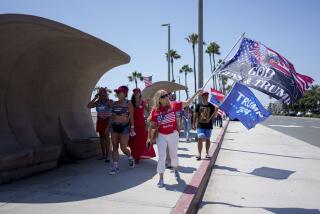Muslims feel sting of initial blame
- Share via
In the immediate wake of the bombing and mass shooting in Norway that left at least 92 people dead Friday, Prime Minister Jens Stoltenberg declared that it was too early to say whether terrorism was involved.
Some interpreted the statement to mean it was unclear whether Muslim extremists were behind the attack.
Right-wing websites quickly pointed the finger at “jihadis,” and Pamela Geller, publisher of the website Atlas Shrugs and executive director of Stop Islamization of America, wrote on her site: “You can ignore jihad, but you cannot avoid the consequences of ignoring jihad.”
Counter-terrorism experts soon weighed in, implicating Al Qaeda.
Then Anders Behring Breivik, described by police as a “right-wing Christian fundamentalist,” was arrested in connection with the attacks.
Within the Muslim community, there was a sigh of relief that it wasn’t someone connected with their religion, but also a sting at being initially scapegoated — not unlike what occurred immediately after the Oklahoma City bombing by right-wing American extremists in 1995.
“This is predictable and something that we have come to expect, but it is sad,” said Safaa Zarzour, secretary general of the Islamic Society of North America. “For most Muslims, it is a confirmation of how they already feel, that they are guilty until proven innocent.”
He said despite the perception of Muslims being always at odds with others, the fight is actually between the mainstream and the extreme of every religion.
Farhana Khera, executive director of Muslim Advocates, worried that the impulse to blame Muslims could lead to further inflaming anti-Muslim sentiment and fueling platforms built upon the demonization of her community.
“I really view it as a wake-up call,” Khera said. “Violence comes from all groups, and singling out one faith community as a target, as much of our society appears to have done, makes us more vulnerable.”
Also worrisome to Muslim groups is the double standard they see with the use of the word “terrorism.”
When attackers are not Muslim, the attack often is not given the “terrorism” label, Khera said, and people think, “ ‘Oh well, it is an isolated incident, or it is a deranged gunman,’ whereas in the case of a Muslim, there is an immediate impulse to understand the person’s faith or ideology,” she said.
Unrelated to the Norway attacks, the Muslim Public Affairs Council on Friday had released a statement on how counter-terrorism trainers who use hate speech directed at Muslims ultimately hurt American national security. IAfter the Norwegian tragedy, when some news media were quick to quote terrorism experts who suggested involvement by Muslims, MPAC said the statement was especially relevant.
The trainers, the statement read, will “build a faulty foundation of information based on marginalizing Islam rather than addressing the goals and tools to further enhancing counter-terrorism measures.”
More to Read
Sign up for Essential California
The most important California stories and recommendations in your inbox every morning.
You may occasionally receive promotional content from the Los Angeles Times.











